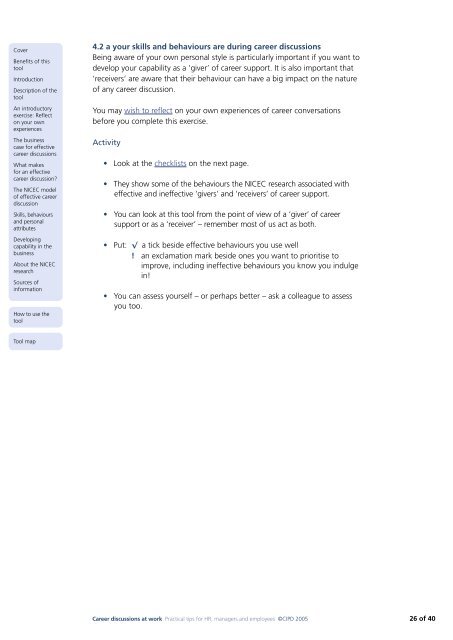Career Discussions at Work, Practical Tips for - CIPD
Career Discussions at Work, Practical Tips for - CIPD
Career Discussions at Work, Practical Tips for - CIPD
You also want an ePaper? Increase the reach of your titles
YUMPU automatically turns print PDFs into web optimized ePapers that Google loves.
Cover<br />
Benefits of this<br />
tool<br />
Introduction<br />
Description of the<br />
tool<br />
An introductory<br />
exercise: Reflect<br />
on your own<br />
experiences<br />
The business<br />
case <strong>for</strong> effective<br />
career discussions<br />
Wh<strong>at</strong> makes<br />
<strong>for</strong> an effective<br />
career discussion<br />
The NICEC model<br />
of effective career<br />
discussion<br />
Skills, behaviours<br />
and personal<br />
<strong>at</strong>tributes<br />
Developing<br />
capability in the<br />
business<br />
About the NICEC<br />
research<br />
Sources of<br />
in<strong>for</strong>m<strong>at</strong>ion<br />
How to use the<br />
tool<br />
4.2 a your skills and behaviours are during career discussions<br />
Being aware of your own personal style is particularly important if you want to<br />
develop your capability as a ‘giver’ of career support. It is also important th<strong>at</strong><br />
‘receivers’ are aware th<strong>at</strong> their behaviour can have a big impact on the n<strong>at</strong>ure<br />
of any career discussion.<br />
You may wish to reflect on your own experiences of career convers<strong>at</strong>ions<br />
be<strong>for</strong>e you complete this exercise.<br />
Activity<br />
• Look <strong>at</strong> the checklists on the next page.<br />
• They show some of the behaviours the NICEC research associ<strong>at</strong>ed with<br />
effective and ineffective ‘givers’ and ‘receivers’ of career support.<br />
• You can look <strong>at</strong> this tool from the point of view of a ‘giver’ of career<br />
support or as a ‘receiver’ – remember most of us act as both.<br />
• Put: √ a tick beside effective behaviours you use well<br />
! an exclam<strong>at</strong>ion mark beside ones you want to prioritise to<br />
improve, including ineffective behaviours you know you indulge<br />
in!<br />
• You can assess yourself – or perhaps better – ask a colleague to assess<br />
you too.<br />
Tool map<br />
<strong>Career</strong> discussions <strong>at</strong> work <strong>Practical</strong> tips <strong>for</strong> HR, managers and employees ©<strong>CIPD</strong> 2005<br />
26 of 40

















